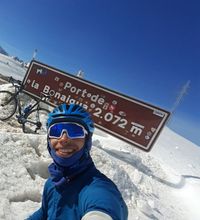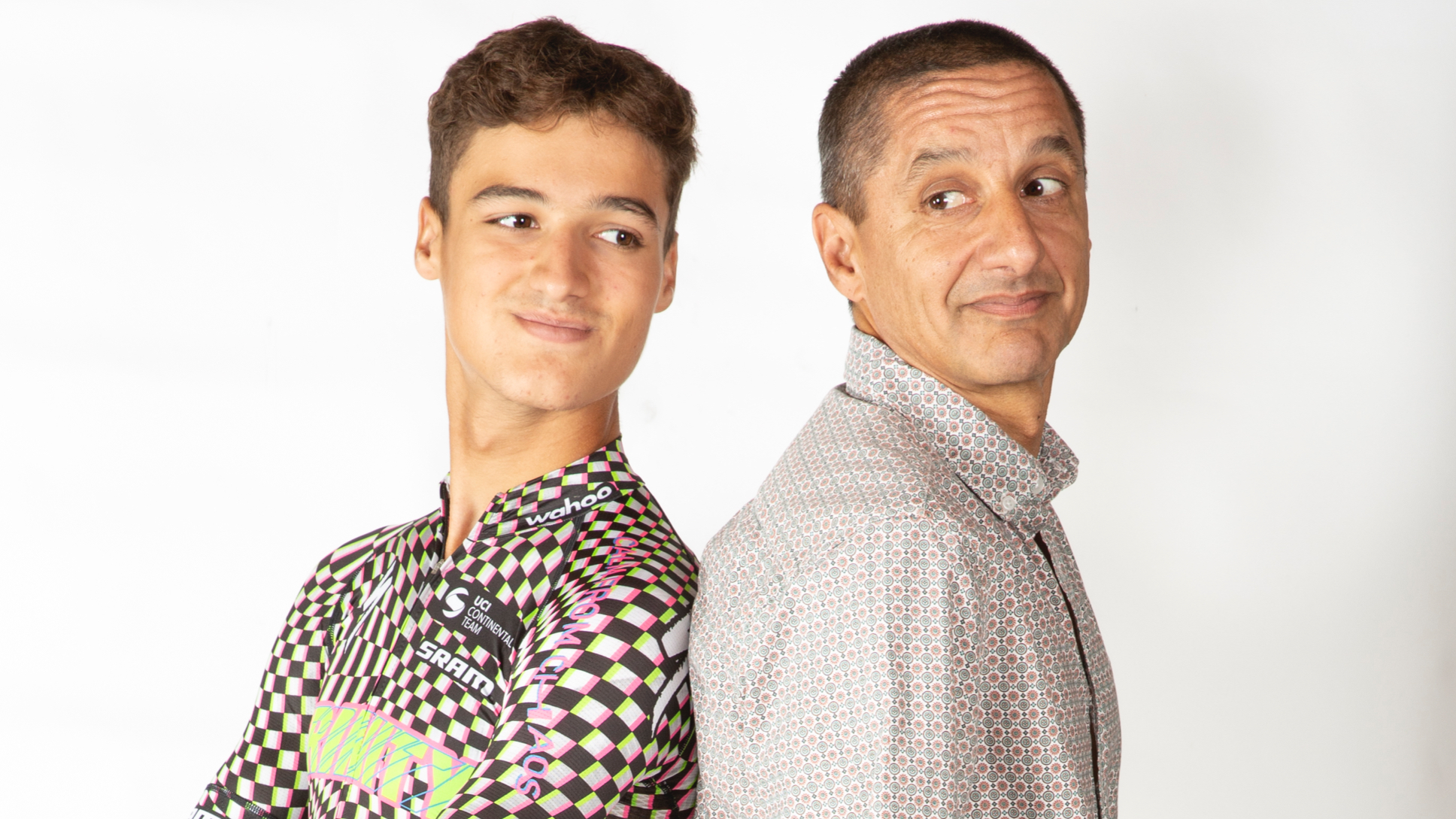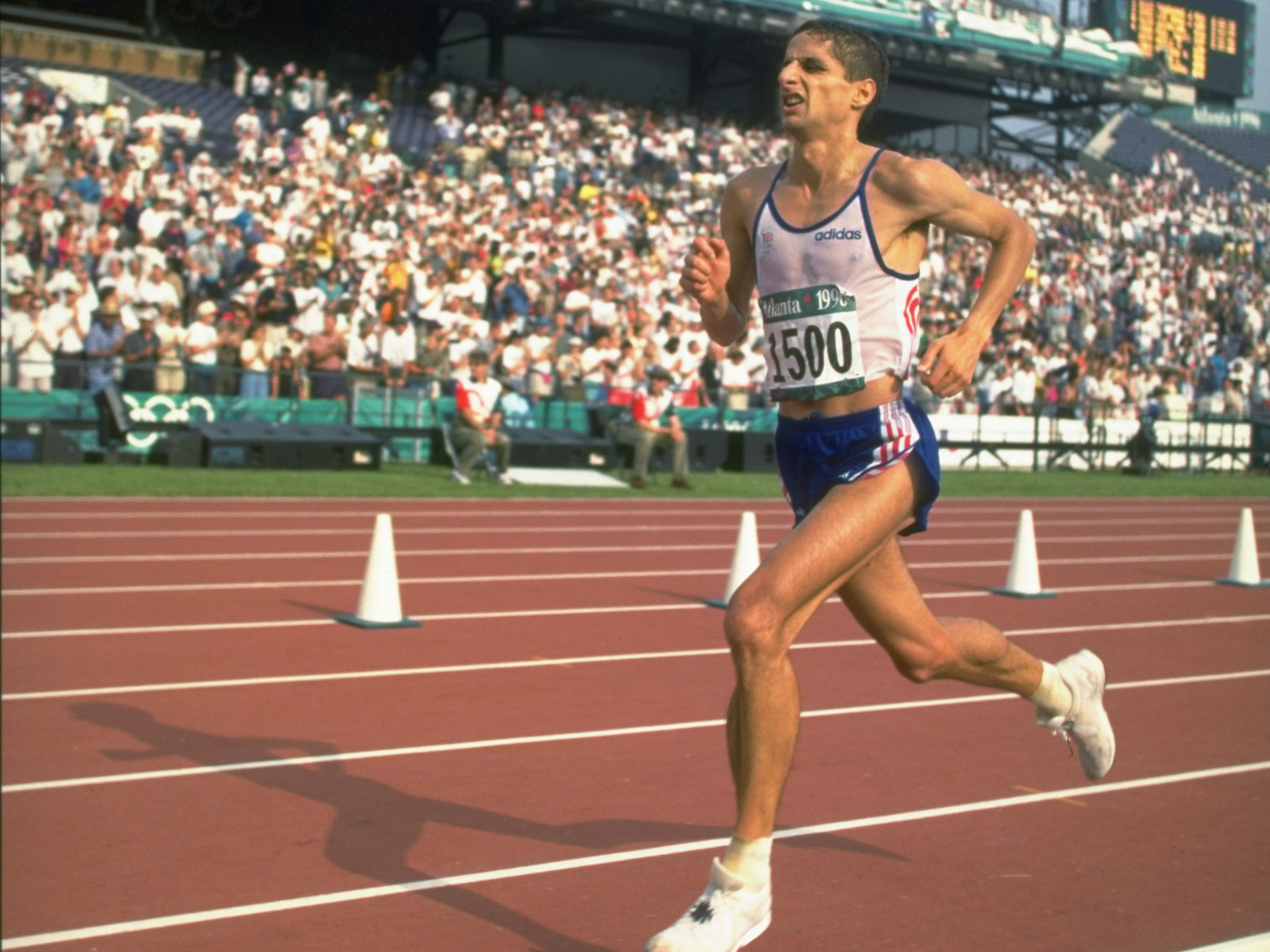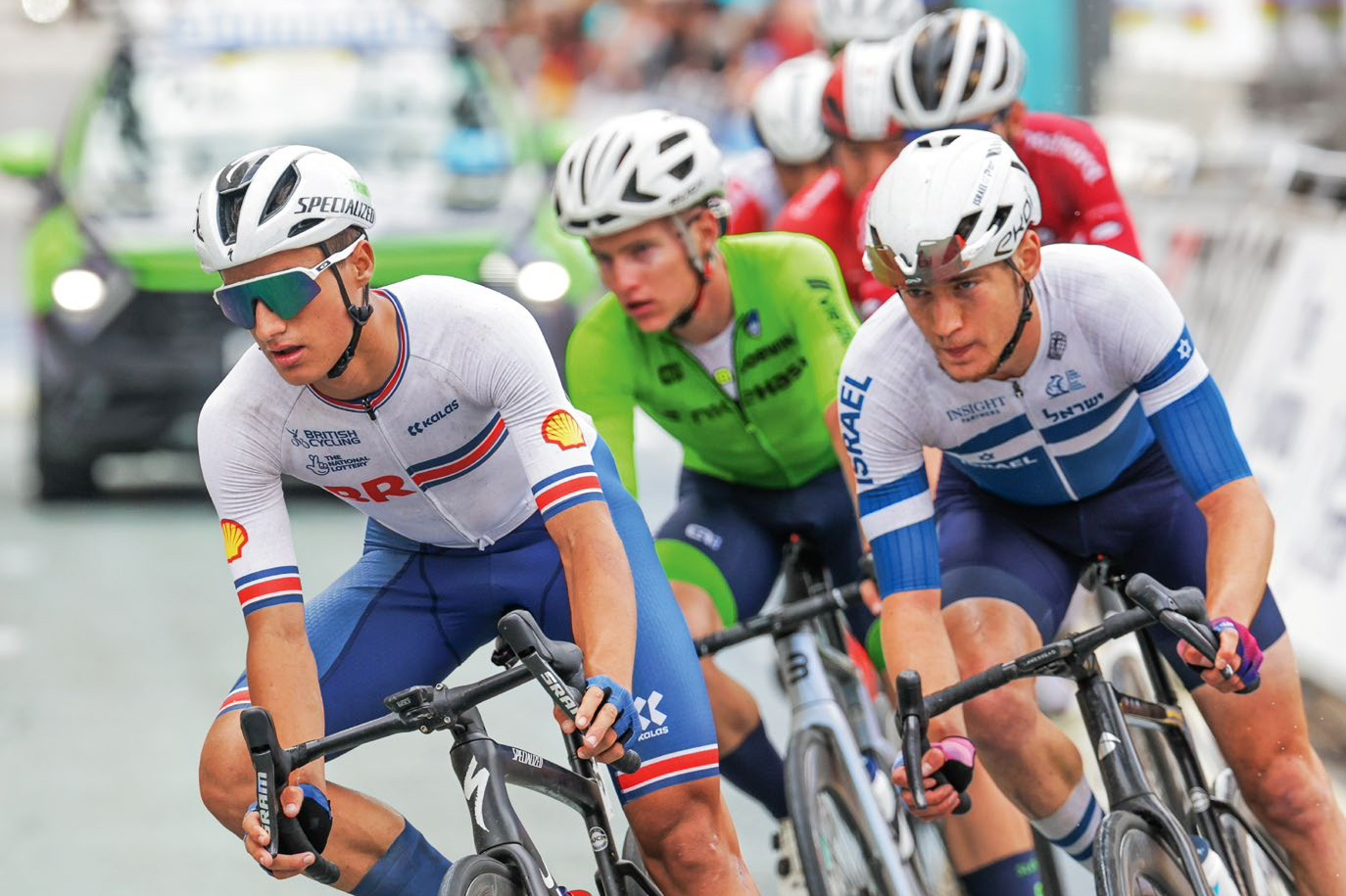Lukas Nerurkar and his dad Richard: 'He'd say cycling is tougher than running but I'd push back a bit'
EF Education's latest young star is the son of Richard Nerurkar, Britain's best marathon runner of the 1990s – how much of Lukas's success is nature and how much nurture?


This feature is part of the MEET THE MAKER series – each edition of which is first published in Cycling Weekly’s print magazine
There’s a new British cycling star on the scene – and he has quite the sporting surname. Twenty-year-old Lukas Nerurkar, a stage winner at the Baby Giro last June and riding for EF Education-EasyPost in 2024, is the son of Richard, Britain’s best marathon runner in the 1990s.
Now 60, Richard Nerurkar finished fifth at the 1996 Atlanta Olympics, aged 32, and his time of 2:08:36 at the London Marathon the following year remains the sixth-fastest time by a Briton.

Born in Wolverhampton to an Indian father and English mother, Richard was a language teacher specialising in German and Russian (he also speaks French). The multi-linguist was a late-starter in elite sport, becoming a professional runner in 1991. After retiring from sport in 2000, he and his wife Gail moved to Ethiopia, and a year later he started what is now known as the Great Ethiopian Run alongside running legend Haile Gebreselassie.
Richard and Gail flew back to the UK to have their first child, daughter Almi, in 2001, and in 2003 they briefly returned to Brighton to have Lukas. The family continued living in Ethiopia until July 2010, when they moved back to Brighton permanently.

On the south coast, Lukas first rode for the Preston Park Youth Cycling Club and, aged 13, completed an Everesting. He rode for VC Londres, then Trinity Racing, and for 2024 he steps up to the WorldTour with EF Education-EasyPost. A climber and a GC rider, he is regarded as one of Britain’s brightest hopes.
We wanted to find out how much Lukas’s sporting development has been inspired and guided by his dad, to weigh up the influence of nurture and nature – by hearing both father and son’s perspectives.
The latest race content, interviews, features, reviews and expert buying guides, direct to your inbox!
Let’s meet them.
Lukas Nerurkar
- Age: 20
- Height: 5ft 10in
- Raised: Addis Ababa, Ethiopia (until age seven)
- Lives: Brighton, UK and Girona, Spain
- Occupation: Cyclist, EF Education-EasyPost
- Biggest sporting achievement: 1st – Stage 5, Giro Next Gen (2023)
Cycling Weekly: Did you have a sporty childhood?
Lukas Nerurkar: Sport in general was a big part of growing up. I was surrounded by my family and their running friends, and it was normalised to do exercise.
When did you want to become a cyclist?
From a really early age. Coming from a running world, the Olympics is all anyone talks about, and in Ethiopia you don’t even hear about the Tour de France. But aged 14 or 15, I understood the sport more, how hard it was, and my aim was to be on a British Conti team. Then I stepped up at junior level, saw the guys at VC Londres in the WorldTour, and that level now seems achievable.
Did you ever consider becoming a runner?
I did quite a bit of running at and during school: middle distance, 800 to 1,500m on the track, and cross-country, but I stopped aged 14 or 15.
Has it helped having lived at altitude?
A few months ago I had my first altitude training camp, and I was wondering the same thing. I feel that I may acclimatise slightly quicker compared to the other guys.
Have you and your dad both got similar body types?
My height and weight are similar to his when he was competing, but my dad’s got stronger legs than most marathon runners. I feel the same: for a climber, I’m not very small, and I’ve got pretty big legs.
Are your VO2max numbers similar?
His record VO2max [92ml/kg/min] is higher than mine is currently, but mine will improve by a few points and I can get close to what his was.
Physiologically, what do you get from your dad?
The slow-twitch fibres, the high fat-max zone [intensity at which the body gets the highest percentage of its energy from fat].
Physiologically, how do you differ from your dad?
One of my strengths – cycling or running – is my sprint. Dad never had a kick.
Do you like similar training conditions?
We prefer heat to cold, that’s for sure. We also really enjoy training and not racing loads, having a big build-up to a certain goal.
Did your dad ever tell his career stories?
Not really, unless we asked about it, but he’s not one who feels the need to tell you about what he’s done in running.
Did your dad ever coach you?
No, because he couldn’t tell me specific cycling sessions. He understands general training principles, and helped me to understand my body, but he leaves the training to me and my coach.
How are you similar personality-wise?
We’re both hard-working and like having a clear goal to work towards.
And how do you differ in terms of character?
I like to prove people wrong – and that I’m right even when I’m not! Dad is a linguist, but I lean towards maths and science.
Describe your dad in three ways.
I only need one: dogged.
What does your dad think of you as an athlete?
Self-motivated and logical.
Could you do what your dad did in his heyday?
I’m not sure with all the training I could ever be a runner. I enjoy it, but not as much as riding a bike.
Could your dad in his heyday ever do what you’re doing?
Potentially. Certain things you need to learn at a young age, like bike- handling. So when he was younger, maybe.
Who’ll have the better career?
I’m hoping it’s going to be me, but for the time being, it’s my dad.
Richard Nerurkar
- Age: 60
- Height: 5ft 10in
- Raised: Bradford, West Yorkshire
- Lives: Brighton, East Sussex
- Occupation: Coffee seller, Haile Coffee
- Biggest sporting achievement: Ran 2:08:36 at London Marathon 1997 – sixth fastest UK time in history
Did Lukas and Almi have sporty childhoods?
Sport is an important part of our lives and we wanted to share that with the children.
When did Lukas first want to become a cyclist?
Aged four he was cycling on the roads in Addis Ababa [Ethiopia]. When we came back to the UK, some would say he was a demon cyclist.
Did he ever consider becoming a runner?
Upon returning to the UK, he swam, ran, and was in the athletics club, but it was pretty obvious that cycling was the thing he wanted to do. The Preston Park Youth Cycling Club made it easy to enjoy cycling with good coaching, and the London Olympics really inspired him.
Has living at altitude helped Lukas?
It’s a hunch that, yes, it has helped both him and Almi [now an international-level runner]. Living at 2,300m for the first seven and nine years of their lives, it has to have affected their development.
Do you both have similar body types?
Not now! But I’d say that broadly speaking, yes, possibly, though Lukas was quite short until he had a growth spurt aged 16 or 17, and his young adult body is different to mine because of the amount of cycling he is doing.
Physiologically, what did you pass on to Lukas?
I was an endurance athlete, he is an endurance athlete – there’s your answer!
And what didn’t you pass on?
I was aware I didn’t have any fast-twitch fibres and could never finish fast in a race, whereas Lukas would always sprint fast in the pool, on the athletics track or in a bike race – that ability hasn’t come from me.
Do you like similar training conditions?
I love sunshine and Lukas does too, but I have respect and admiration for how cyclists like Lukas train and race in extreme weather conditions, whether it’s an awful British winter day, or excessive heat in Portugal. If you want to achieve at a high level, you have to optimise the environmental situation you’re in.
What’s your key to longevity?
I’m getting slower by the month, but my last parkrun was sub-18 minutes. I enjoy exercise, it’s always been part of my life.
Did you tell Lukas and Almi career stories?
I didn’t feel it was appropriate to. If they asked questions as they got older, we’d chat about it, but I never initiated such conversations.
You didn’t mind not being coach?
I never needed to fulfil that role, and I was fortunate that as he was getting more serious about cycling and needed to have training and coaching, others were far better equipped to provide it than me.
How are you similar personality-wise?
Application to the test: we have a desire to achieve and succeed.
And how are you different?
Lukas is more comfortable spending time on his own than I am.
Describe Lukas in three ways?
Independent, knows what he wants to achieve, and is good at working out how to get there.
What does Lukas think of you as an athlete?
He likes the fact that I achieved at a high level.
In your heyday, could you have done what Lukas is doing?
In terms of application and ability to do it, yes I think so – but no because I wasn’t born to be a cyclist.
Who’ll have the better career?
Diplomatic answer: Lukas.
Guess what he said when we asked...
What’s the tougher sport, running or cycling?
Richard: Cycling, without doubt.
Lukas: He’d have said cycling, but I’d push back a little bit.
Who’s got the fiercer competitive instinct?
R: It’s so subjective but probably Lukas.
L: At the moment, me, but I’m sure he was just as competitive as a top runner.
Who enjoys celebrating more?
R: Lukas will most definitely have more opportunities to celebrate than I will!
L: Definitely me. You’ll never catch my dad boasting.
What do you most admire in Lukas?
R: His application to a goal he’s identified for himself.
L: He’d have gone for the way I apply myself, both in sport and my studies.
What’s the most noticeable trait Lukas inherited from Richard?
R: Again, his application to a task, getting a job done.
L: Well, if you’d asked him in lockdown when I shaved my head, he’d have said our faces – I looked a lot like him!
What’s Lukas’s most annoying habit?
R: [Long pause] Leaving his cycling stuff all over the place, including shoes and his helmet on the kitchen table – which he never removes.
L: I bet he said that it’s telling me to do something five times before I do it... I can only think about two or three different things in one given day!
What’s Lukas’s pet peeve?
R: He has the mentality of any top cyclist – not getting too stressed out when things go wrong, so he’s quite laid-back.
L: [Long pause] Yeah, he’s not wrong, but indecisiveness and illogicalness do wind me up – I can hide it.
The full, original version of this article was published in the 28th September 2023 print edition of Cycling Weekly. Subscribe online and get the magazine delivered direct to your door every week.
A freelance sports journalist and podcaster, you'll mostly find Chris's byline attached to news scoops, profile interviews and long reads across a variety of different publications. He has been writing regularly for Cycling Weekly since 2013. In 2024 he released a seven-part podcast documentary, Ghost in the Machine, about motor doping in cycling.
Previously a ski, hiking and cycling guide in the Canadian Rockies and Spanish Pyrenees, he almost certainly holds the record for the most number of interviews conducted from snowy mountains. He lives in Valencia, Spain.
